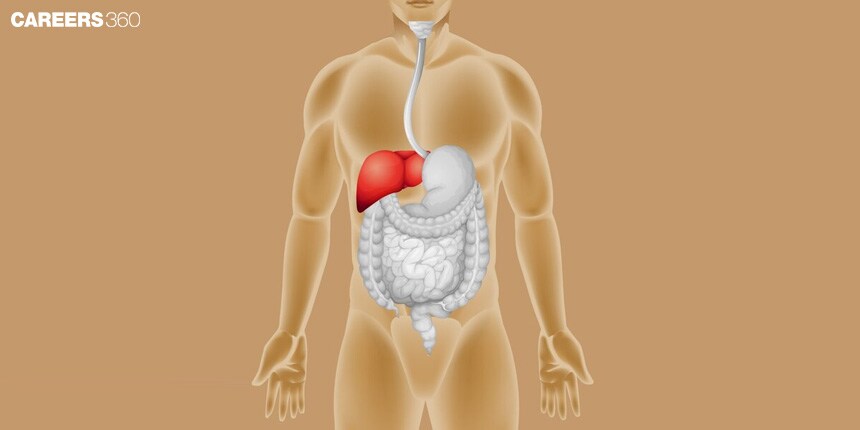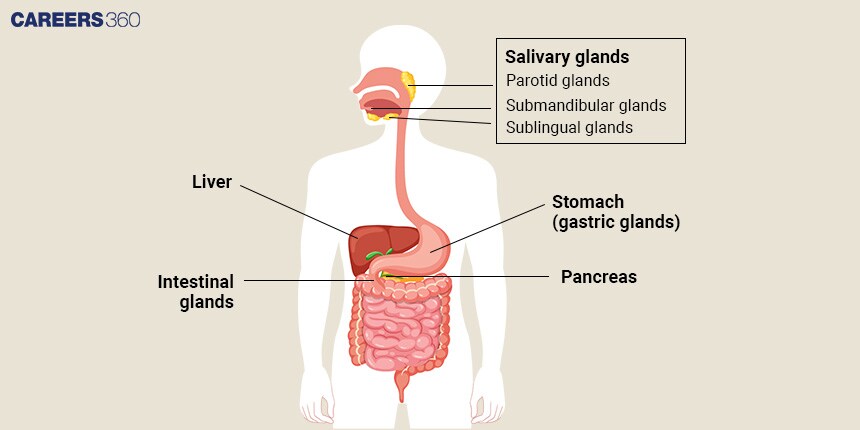Digestive Glands: Definition, Function, Diagram, Examples
What Are Digestive Glands?
Digestive glands are part of the digestive system, specially designed to produce and secrete certain enzymes accompanied by other substances in charge of food digestion. They are, therefore, of great significance in breaking down ingested food into molecules simple enough to be easily absorbed and utilised by the body. In their absence, digestion would have its efficiency reduced considerably, often giving rise to phenomena of malnutrition and several gastrointestinal disorders.
NEET 2025: Mock Test Series | Syllabus | High Scoring Topics | PYQs
NEET Important PYQ's Subject wise: Physics | Chemistry | Biology
New: Meet Careers360 B.Tech/NEET Experts in your City | Book your Seat now
- What Are Digestive Glands?
- Types Of Digestive Glands
- Functions Of Digestive Glands
- Disorders Of Digestive Glands
- The Video Recommended On Digestive Glands:

The digestive glands release secretions that discharge enzymes and other chemicals necessary for the digestion of a food constituent material into its basic energies or respective nutrients. These glands include the salivary, gastric, pancreatic, hepatic, gallbladder, and intestinal glands, each of them distinctly contributing to digestion.
Types Of Digestive Glands
Several types of digestive glands form a part of the digestive system; each is involved in performing the activity of digestion and absorption of foodstuffs. These glands synthesise enzymes and other substances that aid in digestion. They convert complex foodstuffs into simpler, absorbable molecules that help in the process of digestion. The different forms of digestive glands include:
Salivary Glands
Types: Parotid, Submandibular, and Sublingual
Function: Saliva secretion, enzyme production (amylase)
Gastric Glands
Types: Cardiac, Fundic, Pyloric
Function: Secretion of gastric juices, HCl, pepsinogen
Pancreas
Structure: Exocrine and endocrine parts
Function: Enzyme secretion, hormone production
Liver
Structure: Lobes and lobules
Function: Bile production, detoxification, metabolism
Gallbladder
Function: Storing and concentrating bile
Intestinal Glands
Location: Crypts of Lieberkuhn in the small intestine
Function: Secretion of intestinal juices, digestive enzymes
Diagram: Types Of Digestive Glands
The diagram given below shows the structure and location of digestive glands.

Functions Of Digestive Glands
Digestive glands perform some very vital functions that are necessary for the normal digestion and absorption of nutrients.
Food Breakdown
Mechanical and Chemical Digestion: The food is mechanically broken down in the digestive glands and chemically digested by enzymatic action.
The action of Enzymes on Carbohydrates, Proteins and Fats: The ingested enzymes released from these glands work on specific macromolecular entities to break them down into units that can be absorbed.
Absorption Of Nutrients
Emulsification of Fats by Bile: Bile from the liver emulsifies fats, preparing them for digestion.
Absorption Processes of Nutrients, Enzyme-Specific: It is ensured that all nutrients will be completely digested and absorbed due to enzymes from both the pancreas and intestines.
Disorders Of Digestive Glands
There are many disorders which affect the digestive glands and thus affect their functioning, leading to digestive disorders.
Salivary Gland Disorders
Common Issues: Mumps, sialolithiasis
Symptoms and Treatments: Swelling, pain, dry mouth; treatments may include medication or surgery.
Gastric Gland Disorders
Common Issues: Gastritis, ulcers
Symptoms and Treatments: Stomach pain, nausea, bleeding; treatments involve medication and lifestyle changes.
Pancreatic Disorders
Common Issues: Pancreatitis, diabetes
Symptoms and Treatments: Abdominal pain, digestive problems, high blood sugar. Treatments may include medication, dietary changes, and insulin therapy.
Liver Disorders
Common Issues: Hepatitis, cirrhosis
Symptoms and Treatments: Jaundice, fatigue, liver dysfunction; treatments include medication, lifestyle adjustments, and in such serious cases, liver transplantation.
Gallbladder Disorders
Common Issues: Gallstones, cholecystitis
Symptoms and Treatments: Pain, nausea, jaundice; medication or surgical removal of the gallbladder
Conclusion
In summary, digestive glands are very essential for the digestive system to work correctly in ensuring that there will always be a breakdown and absorption of nutrients necessary for health. With the advancement of medical research, more understanding of the disorders of the digestive gland has been revealed to apply better treatments benefiting the patients. Balanced diets alongside water intake, regular exercise, and regular medical checkups are important attributes towards living with healthy digestive glands.
The Video Recommended On Digestive Glands:
Frequently Asked Questions (FAQs)
The main digestive glands are salivary glands, gastric glands, pancreas, liver, gallbladder, and intestinal glands.
The digestive enzymes obtained from the pancreas are trypsin, lipase, and amylase. The hormones absorbed from it are insulin and glucagon.
Salivary glands produce saliva that carries the enzyme amylase. This enzyme starts digestion by breaking down carbohydrates into simple sugars for them to be absorbed.
Common disorders involving the organ include hepatitis, cirrhosis, and a fatty liver.
Most dietary recommendations will help keep digestive glands in proper working order if one adheres to them. These include adequate intake of a balanced diet, adequate hydration of the body, regular exercise, avoiding excessive alcohol consumption, and regular visits to the doctor.
Also Read
30 Nov'24 03:25 PM
26 Nov'24 05:38 PM
25 Nov'24 06:43 PM
25 Nov'24 05:45 PM
25 Nov'24 04:48 PM
25 Nov'24 03:52 PM
23 Nov'24 04:30 PM
23 Nov'24 10:03 AM